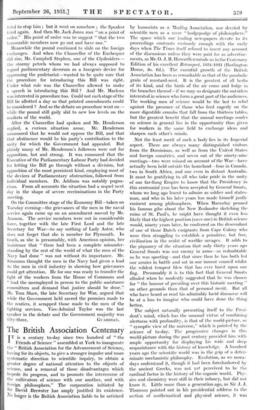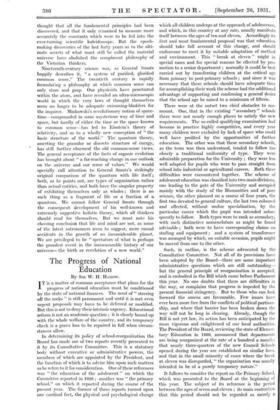The British Association Centenary
IT is a century to-day since two hundred of the Friends of Science " assembled at York to inaugurate the " British Association for the Advancement of Science, having for its objects, to give a stronger impulse and more systeinatic direction to scientific inquiry, to obtain a greater degree of national attention to the objects of science, and a removal of those disadvantages which impede its progress, and to promote the intercourse of the cultivators of science with one another, and with foreign philosophers." The corporation initiated by Sir David Brewster has amply justified its existence. No longer is the British Association liable to be satirized by humorists as a Mudfog Association, nor decried by scientific men as a mere " hodgepodge of philosophers." The space which our leading newspapers devote to its proceedings contrasts curiously enough with the early days when The Times itself refused to insert any account of the discussions unless they were paid for as advertise- ments, as Mr. 0. J. R. Howarth reminds us in the Centenary Edition of his excellent Retrospect, 1831-1931 (Burlington House, 3s. ed.). The essential growth of the British Association has been as remarkable as that of the parabolic grain of mustard-seed. It is the greatest of all herbs of its kind, and the birds of the air come and lodge in the branches thereof—if we may so designate the outsiders interested in science who form a great part of the audiences. The working men of science would be the last to rebel against the presence of those who feed eagerly on the more digestible crumbs that fall from the thirteen tables, but the greatest benefit that the annual meetings confer on science in general lies in the opportunity thus given for workers in the same field to exchange ideas and sharpen each other's minds.
Not the least merit of such a body lies in its Imperial aspect. There are always many distinguished visitors from the Dominions, as well as from the United States and foreign countries, and seven out of the ninety-nine meetings—two were missed on account of the War—have actually been held outside the homeland—four in Canada. two in South Africa, and one even in distant Australia. It must be gratifying to all who take pride in the unity of our far-flung Empire to know that the Presidency in this centennial year has been accepted by General Smuts, whom we long ago learnt to admire as soldier and states- man, and who in his later years has made himself justly eminent among philosophers. When Macaulay penned his famous gibe about the New Zealander sketching the ruins of St. Paul's, he might have thought it even less likely that the highest position (save one) in British science would, ninety years later, be conferred on the descendant of one of those Dutch emigrants from Cape Colony who were then struggling to establish a primitive, but free, civilization in the midst of warlike savages. It adds to the piquancy of the situation that only thirty years ago General Smuts was our enemy in arms—as redoubtable as he was sporting—and that since then he has both lcd our armies in battle and sat in our inmost council whilst the wildest tempest blew that has ever burst upon our flag. Presumably it is to this fact that General Smuts alluded when he modestly suggested that he was chosen for " the honour of presiding over this historic meeting " on other grounds than that of personal merit. But all who have heard or read his admirably lucid discourse will be at a loss to imagine who could have done the thing better.
The subject naturally presenting itself -to the Presi- dent's mind, which has the unusual virtue of combining alertness with profundity, is that of the world-picture, or " synoptic view of the universe," which is painted by the science of to-day. The progressive changes in this world-picture during the past century provided him with ample opportunity for displaying his wide and deep acquaintance with the history of knowledge. A hundred years ago the scientific world was in the grip of a deter- minate mechanistic philosophy. Evolution, as we nowa- days understand it, though it had been foreshadowed by the ancient Greeks, was not yet perceived to be the cardinal factor in the history of the organic world. Phy- sics and chemistry were still in their infancy, but did not know it. Little more than a generation ago, as Sir J. J. Thomson pointed out in his presidential address to the section of mathematical and physical science, it was thought that all the fundamental principles had been discovered, and that it only remained to measure more accurately the constants which were to be fed into the ever-turning scientific kaleidoscope. But the epoch- making discoveries of the last forty years as to the ulti- mate secrets of what must still be called the material universe have abolished the complacent philosophy of the Victorian thinkers.
Nineteenth-century science was, as General Smuts happily describes it, " a system of purified, glorified common sense." The twentieth century is rapidly formulating a philosophy at which common sense can only stare and gasp. Our physicists have penetrated within the atom, and have revealed an ultra-microscopic world in which the very laws of thought themselves seem no longer to be adequate swimming-bladders for the inquirer. Minkowski's revolutionary notion of space- time—compounded in some mysterious way of time and space, but hardly of either the time or the space known to common sense—has led to Einstein's theory of relativity, and so to a wholly new conception of " the basic structure of the world." The quantum theory, asserting the granular or discrete structure of energy, has still further obscured the old common-sense views. The general acceptance of the facts of organic evolution has brought about " a far-reaching change in our outlook on the universe and our sense of values." We would specially call attention to General Smuts's strikingly original comparison of the quantum with life itself ; both, as he points out, are types of organization rather than actual entities, and both have the singular property of exhibiting themselves only as wholes ; there is no such thing as a fragment of life or a fraction of a quantum. We cannot follow General Smuts through the consequent development of his well-known and extremely suggestive holistic theory, which all thinkers should read for themselves. But we must note his cheering conclusion that life and mind are not, as some of the latest astronomers seem to suggest, mere casual accidents in the growth of an inconsiderable planet. We are privileged to be " spectators of what is perhaps the grandest event in the immeasurable history of our universe—the birth or revelation of a new world."



































 Previous page
Previous page